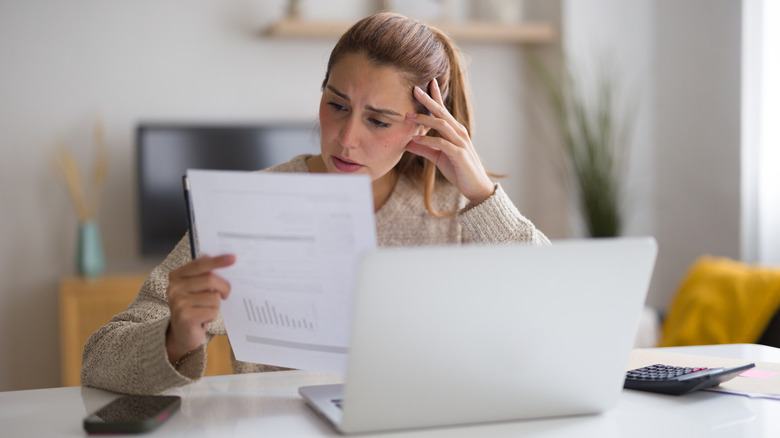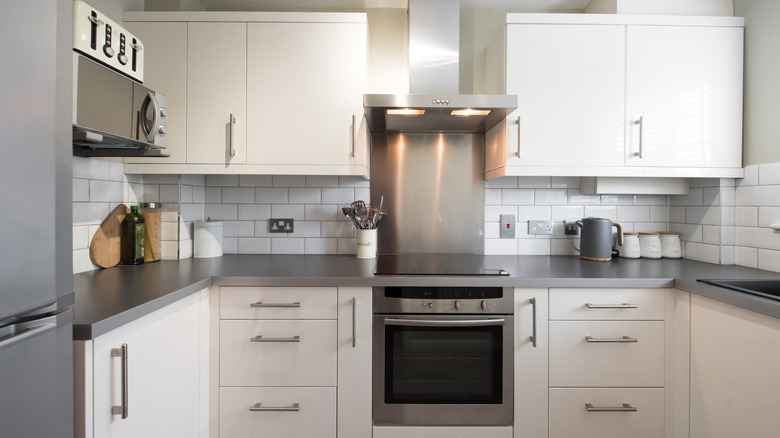The Kitchen Appliance That's Wasting The Most Energy (& Your Money)
When you think about the biggest energy hogs in your home, you probably picture the air conditioner running on a super hot summer day, or the furnace kicking on during a winter freeze. But there is a quiet giant hiding in plain sight that consumes a shocking amount of power: your electric oven. Unlike your fridge, which sips energy consistently throughout the day, your oven is designed to use a massive burst of electricity in a short time frame to reach and maintain high temperatures. An average electric oven consumes anywhere from 2,000 to 5,000 watts of power, and can draw as much energy in a single hour as a modern fridge uses in an entire day.
An electric oven's need for high-wattage and on-demand energy consumption, is what can make it such a detriment to your monthly power bill, even in comparison to the cost and efficiency of gas ovens. While a typical refrigerator uses around 300 to 800 watts, it cycles off and on, resulting in a constant but low overall energy draw. In contrast, an oven's heating elements uses brute force energy for cooking, thereby pulling a huge load of power to rapidly heat coils and circulate air. According to the U.S. Energy Information Administration, the average cost of electricity is around 17.47 cents per kilowatt-hour (kWh). At a rate of 2,800 watts, your oven usage could cost around 48 cents per hour to run. Even if you only use it for a few hours a week, that concentrated energy drain adds up fast.
The problem does not stop when you turn your oven off
One of the most surprising facts about your electric oven is that it can still be costing you money even when you are not using it. This is due to what energy experts call "vampire power" or "phantom load." While the heating elements may be off, modern ovens are equipped with digital clocks, touch displays, and internal computer systems that remain on and at the ready 24/7. These components draw a small but constant trickle of electricity just by being plugged in. And while a single gadget's phantom power is negligible, when you add up all of it from around your house (like your oven's clock or your TV), it can account for up to 10% of your total electricity bill. Phantom power is a super sneaky way to lose money even without using anything, and a good reason to check out the smart home devices that can make your home more efficient.
While the overall annual energy consumption of a fridge, which is always on, will likely be higher than an oven's, which is only used occasionally, the comparison of their energy draw per hour is a real wake-up call. A refrigerator's power draw is low and steady, ranging from 1-2kWh per day, costing a few hundred dollars a year. An oven's high-wattage pull, though short-lived, is where the real damage is done. And though unplugging your oven to stop the phantom drain is not practical, or safe, recognizing this hidden cost is the first step to being a more mindful energy consumer.
Mindful solutions for a big problem
The good news is that you do not have to stop baking to save money. By adjusting a few habits, you can significantly slash your electric oven's energy footprint. For starters, only use the oven for larger tasks. For smaller dishes or reheating leftovers, a microwave or toaster oven is far more energy-efficient, as they heat smaller spaces faster with less power. Another easy trick is to look for ways to cook more food at once. Batch-cooking meals or baking multiple things at the same time takes advantage of the heat you are already generating, meaning you are pretty much just paying that steep oven-usage cost once instead of multiple times in a week. You can also turn off the oven a few minutes before the food is finished, as the residual heat will finish cooking it without drawing any more power.
Ultimately, caring about your oven's energy consumption is not just about saving a few dollars on your power bill, it is also about making smarter choices that benefit both your wallet and the environment. Every kilowatt-hour you save reduces your personal carbon footprint and lessens the demand on your local power grid. There are genius tricks to save money on electricity while using your oven. These small tweaks, from using the right appliance for the job to embracing your oven's convection setting, can lead to huge long-term savings and a more energy-conscious home.


